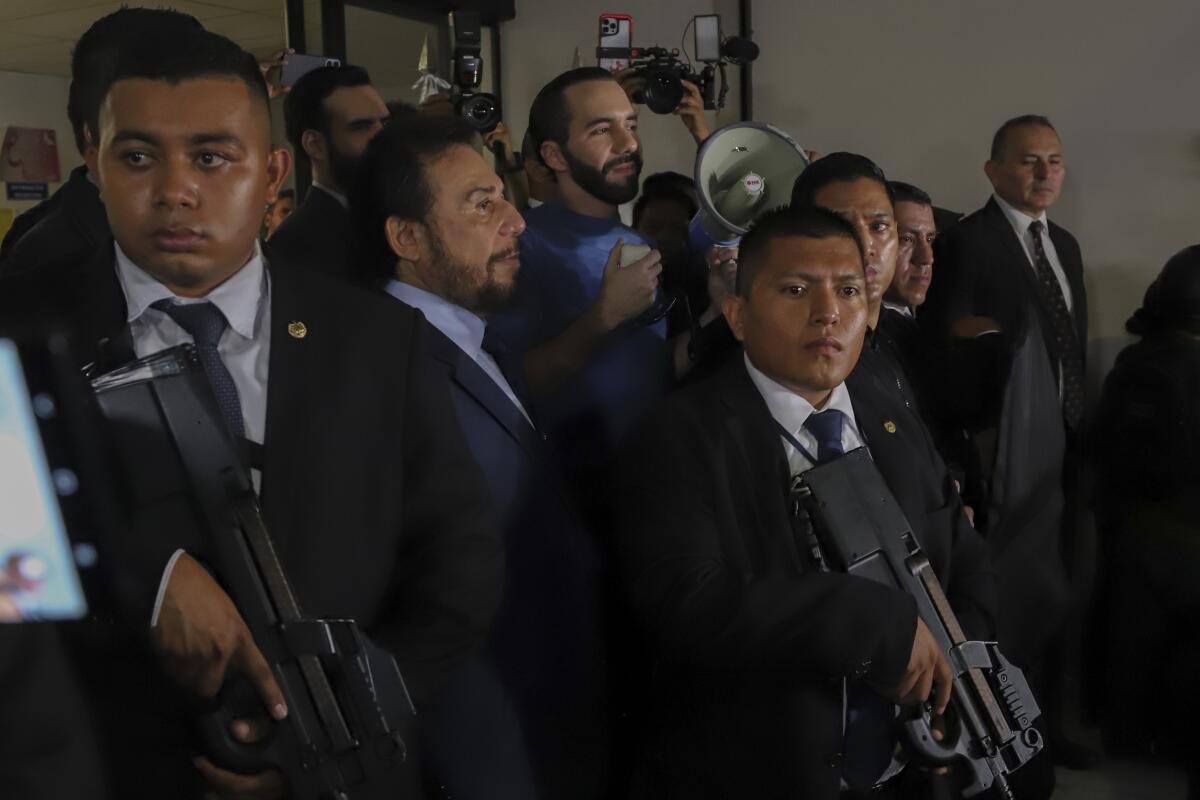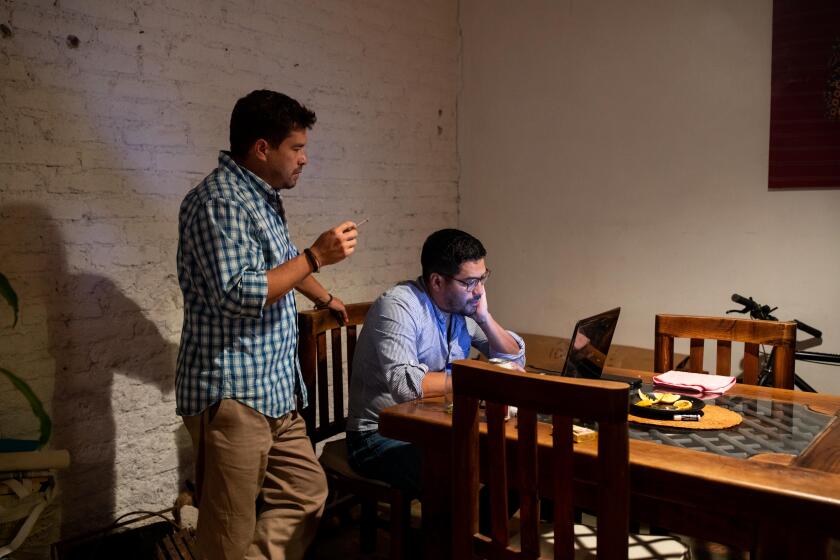El Salvador’s President Bukele registers for 2024 reelection — which the constitution does not allow

- Share via
SAN SALVADOR — El Salvador’s President Nayib Bukele registered as his party’s candidate to seek reelection in the country’s presidential vote next year, a decision raising concern Friday because the constitution prohibits it.
Bukele and his running mate, current Vice President Félix Ulloa, were the last to register before the deadline at midnight Thursday.
In typical Bukele fashion, the last-minute registration became a spectacle, coming amid rumors the president had been hospitalized.
Instead, he exited electoral offices to a crowd of cheering supporters.
“We are ready to change whatever we have to change to be able to insert ourselves even more in the community of nations, but always respecting our sovereignty and independence,” said Bukele, speaking through a megaphone.
The Salvadoran Constitution prohibits reelection, but in 2021, the country’s Supreme Court of Justice ruled that one of its articles allows the president — who serves a five-year term — to run for reelection once. Bukele announced he would seek a second term with the New Ideas Party a year later.
Politicians in Latin America are adopting Salvadoran President Nayib Bukele’s style — aviator sunglasses, leather jackets, baseball caps — and his politics.
Thousands of Bukele’s supporters had gathered early Friday in front of the Supreme Electoral Tribunal and did not leave until the president came out to shake their hands, amid shouts of “Reelection, reelection” and “Nayib, my friend, the people are with you.”
U.S. Assistant Secretary of State for Western Hemisphere Affairs Brian A. Nichols, who was visiting El Salvador, raised questions on a Salvadoran television talk show Friday morning about Bukele’s decision, but maintained that the issue was not for other countries to decide.
“There has to be a broad debate about the legality and legitimacy of the election, but it is a debate for Salvadorans,” Nichols said ahead of a meeting with Bukele.
Salvadorans “will have the opportunity to express their will at the polls, and they can decide whether they agree or disagree with that process,” he told reporters afterward.
Several polls suggest that Bukele would win reelection by a wide margin: He has remained highly popular during his heavy-handed crackdown on the country’s powerful street gangs.
Journalists in El Salvador who write about gangs can now be sent to prison. Two brothers defy the law with a story tying President Nayib Bukele to violent street gangs.
Bukele, who pointed out that some “developed countries” might disagree with his decision to run, said, “They are not the ones who will decide, but the Salvadoran people. The Salvadoran people will decide if they want to continue building this new El Salvador, or if they want to return to that country that was known for gangs and death.”
Ulloa recently said that once Bukele’s candidacy was made official, the president would have to ask Congress for permission to leave office before Dec. 1, six months before the beginning of the new presidential term. Congress would then elect an interim replacement.
Constitutional lawyers including Abraham Abrego with the human rights organization Cristosal argue that the president’s reelection bid is illegal.
“Immediate reelection is expressly prohibited by six constitutional articles, as well as the spirit of the 1983 Constitution, which established a five-year presidential term without the possibility of immediate reelection,” Abrego said.
Critics of the plan to make bitcoin legal tender in El Salvador say the cryptocurrency’s extreme volatility could bring devastation to one of the poorest countries in the hemisphere.
Other lawyers, although recognizing that reelection is prohibited by the constitution, said that the endorsement of the Supreme Court makes it a null issue, adding that if the electoral tribunal considers it an illegitimate application, the final decision would revert back to the same chamber of the Supreme Court that already ruled in favor of Bukele’s bid.
The prospect of his reelection is not the only novelty coming to El Salvador’s February presidential race. Remote, online voting from abroad will be allowed for the first time, and in-person electronic booths will be available in 29 countries, with most booths in the United States.
A total of 6.1 million Salvadorans are eligible to vote, including thousands living abroad, who will also be able to run for public office.
More to Read
Sign up for Essential California
The most important California stories and recommendations in your inbox every morning.
You may occasionally receive promotional content from the Los Angeles Times.












